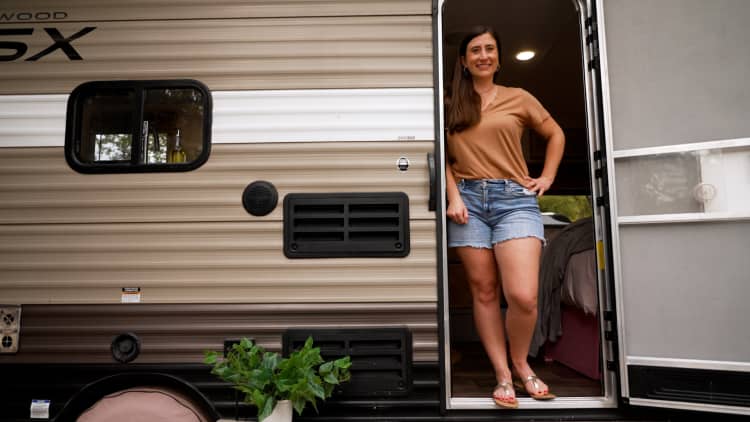Laura Gariepy spent 10 years working in corporate human resources before she realized she needed to make a change.
Her salary was enough for her to live comfortably while investing a good portion toward early retirement. But when she experienced a death in the family, she realized that her company's values and hers didn't necessarily align.
"I had three days of bereavement leave," Gariepy, 38, tells CNBC Make It. "I thought, 'This is unacceptable. How many more times is this going to happen between now and when I reach [financial independence]?'"
Gariepy quit her job and temporarily lived off cash reserves and money she had originally earmarked for early retirement.
"I said, 'OK, I have this money in the bank. Instead of leaving it there until I'm retirement age, I'm going to quit my job and give myself some space to figure it out,'" she says.
She started blogging about her sabbatical and the financial steps she took that allowed her to do it. Soon, she was asked to contribute a post to a financial blog, a gig that, unexpectedly, paid.
"It was a total 'aha' moment for me," Gariepy says. "I've always liked to write. I said, 'If I can replicate this enough times, I can earn a living.'"
Gariepy says it took a little over a year from that first paid post to build enough freelance work to replace her corporate salary. These days, she continues to work as a freelance writer and makes between $75,000 and $120,000 a year, depending on how much she works. She also coaches those looking to follow in her footsteps through her site, Before You Go Freelance.
The biggest thing her clients overlook when starting out?
"You don't go from your present circumstance to your ideal circumstance just because you decide to make that transition," Gariepy says. "There's a lot of work to be put in to make that happen. And there has to be a total mindset shift from employee to entrepreneur."
Gariepy's top tips for aspiring freelancers
The range of would-be freelancers runs the gamut, Gariepy says, from people looking to continue doing similar work to those looking for a complete career reset.
Regardless of where you fall on that spectrum, here are Gariepy's top two tips to keep in mind.
1. Network with clients and potential mentors
Leaving a salaried position for freelance work means that no one is coming to put an assignment on your desk. As a freelancer, "I have to say, 'I'm gonna go out and chase the next client.' I have to pursue that work," Gariepy says.
It may be very slow going at first — especially if you don't have a deep roster of clients from your last job. "Unless you're extremely well connected, you have to go into it with the expectation that you're not going to make a lot of money freelancing upfront."
While you're building a portfolio of freelance work, you'd be wise to not only network with potential clients, but also with other freelancers, who may be willing to mentor you and even throw some gigs your way.
"If someone comes to me and says 'Hey, Laura, I want you write an article for $X,' but it's below what I'm accepting currently, maybe I know a newer writer who would love to have that opportunity," Gariepy says.
2. Set up financial guardrails
Because she was saving prodigiously for early retirement, Gariepy had enough money on hand to cover her living expenses while she figured things out. (She has since put a pause on her FIRE journey, preferring the flexibility and freedom of her freelance lifestyle, for now.)
Had she not had ample cash savings, she says, she wouldn't have been able to make the decision to leave her job as quickly as she did.
"If I had been living paycheck-to-paycheck at the time, I would have had to do things completely differently," Gariepy says. "I certainly don't advise anyone to up and quit their job if they don't have that cushion."
If you don't have savings to fall back on, Gariepy suggests a more gradual transition — building up a freelance portfolio on the side while keeping your day job and growing your savings.
"Gradually, that side income you're building equals or surpasses your salary, and then you can make the switch," she says.
But even if you've completely replaced your salary, you still need a cash buffer if you want to do freelance work.
"If you've quit your corporate job but you only have $1,000 in the bank, what happens next month if all of your clients fly the coop?" says Gariepy. "You need that client base in place, but you also need that safety net."
DON'T MISS: Want to be smarter and more successful with your money, work & life? Sign up for our new newsletter!
Get CNBC's free Warren Buffett Guide to Investing, which distills the billionaire's No. 1 best piece of advice for regular investors, do's and don'ts and three key investing principles into a clear and simple guidebook.
CHECK OUT: 38-year-old financial coach spends only $124 on groceries a month—her No. 1 tip for food shopping



